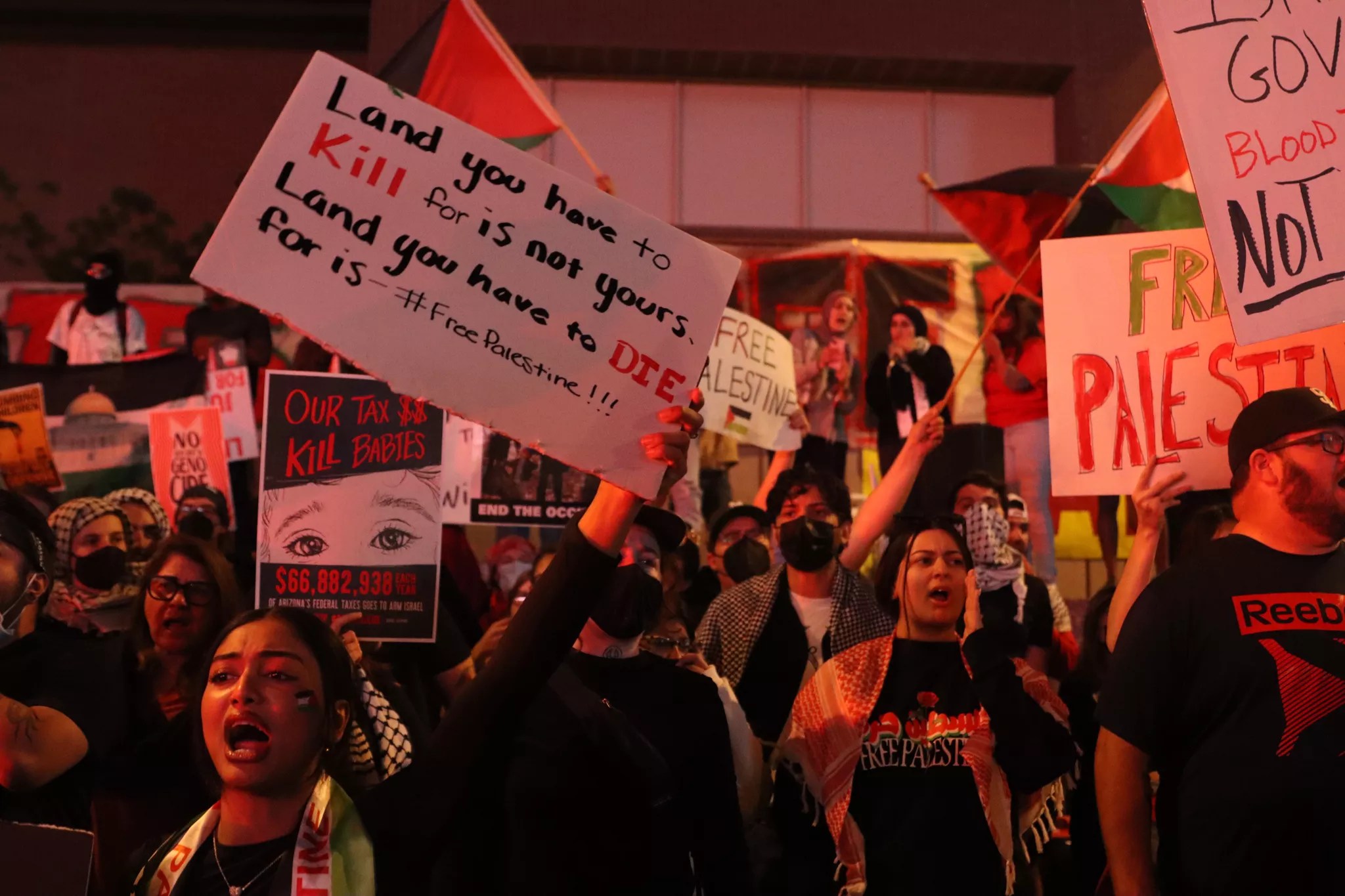
Kayla Mae Jackson/Cronkite News

Audio By Carbonatix
It was a constant feature of the Kamala Harris campaign.
Whenever the vice president and Democratic presidential nominee spoke at an event in Arizona leading up to the Nov. 5 election, a pro-Palestine protester was sure to interrupt her. Harris sometimes acknowledged them, and sometimes she did not, but the protests were an explicit warning.
Harris needed to push for an arms embargo of Israel, which has killed more than 43,500 people in Gaza in reprisal for a deadly surprise attack by Hamas on Oct. 7, 2023. Otherwise, she did not have the pro-Palestine movement’s votes.
That movement has gone by different names – the Uncommitted Movement, Abandon Harris, No Endorsement – and last week, its members followed through on their threat. In Arizona and beyond, many pro-Palestinian activists didn’t cast their ballot for Harris, who suffered a resounding defeat to former President Donald Trump.
“This was a wake-up call,” said Palestine activist Rowan Imran. “Dismissing entire communities is a grave mistake.”
Though Harris lost ground with nearly every imaginable demographic group, some were quick to blame pro-Palestine protesters for paving a path for Trump’s return. But while a Trump Administration will likely be worse for Palestinians in Gaza and in the West Bank, Arizona’s small pact of pro-Palestinian activists who voted third party this year have few regrets.
To Mohye Abdulaziz, a 77-year-old Palestinian-Arab American and founder of the Arizona Palestine Solidarity Alliance, Democrats scapegoating pro-Palestine voters for Trump’s win are “pathetic.”
“They didn’t care about us, and now they are saying that we actually had influence?” Abdulaziz said. “We wanted to work with them, and they refused us. It doesn’t make any sense.”
Abdulaziz and others are disappointed by Harris’ and President Joe Biden’s reluctance to meaningfully pursue a ceasefire in Gaza. While the administration has tut-tutted Israel for not taking enough care to prevent civilian casualties – over the weekend, Israeli air strikes killed 44 Palestinians in civilian areas – it has not stopped arming the regime of Israeli Prime Minister Benjamin Netanyahu.
During her campaign, Harris ignored Abdulaziz and other activists’ demands, including denying a member of the Uncommitted Movement a chance to speak at the Democratic National Convention. Feeling shut out by the Democratic Party, pro-Palestinian voters returned the favor.
Though Trump picked up votes in the Michigan city of Dearborn, which has a large Arab population, it’s unclear if the third-party votes of pro-Palestinian activists really tilted the contest nationally or in Arizona. As of Tuesday afternoon, Trump was beating Harris in Arizona by more than 182,000 votes. Even if Harris had collected all nearly 34,000 third-party votes, she’d still be more than 148,000 votes short.
“It did not feel like if they had voted for Kamala that we would have won,” said Sarah León, a progressive community organizer. “I don’t want anyone to go blame them.”
Belén Sisa, a political strategist who was a part of Vote Ceasefire AZ during the state’s Presidential Preference election, agreed.
The Democrats “decided to run a weak campaign, and you can’t blame anyone but yourself,” she said. “It’s time to look in the mirror.”

Former President Donald Trump and Israeli Prime Minister Benjamin Netanyahu have maintained a close relationship.
Israeli Ministry of Foreign Affairs/Flickr/CC BY-NC 2.0
‘Not a win for us’
Still, activists hardly feel happy with how things turned out. They don’t trust Trump.
The incoming Republican president has signaled he’d like to remove any restraints on how Israel conducts the war. At best, the Israeli Defense Forces have shown perilously little concern about civilian deaths. In addition to the nearly confirmed 44,000 dead in Gaza, another 10,000 are believed to be dead, according to Palestinian health authorities. Seventy percent of the dead are women and children, according to the U.N. Human Rights Office.
Having Trump in the Oval Office doesn’t exactly fill ceasefire activists with hope.
“Trump winning is not a win for us, it’s not a win for our communities,” Imran said. “I wanted to scream and laugh and cry.”
To Imran and Abdulaziz, the specter of Trump’s return seemed to be the Democrats’ only argument to win their votes. Imran said it was “incredibly demoralizing” to be told, “Yeah, it’s bad, but it could be worse.”
“They expected us to vote for them, literally on fear of Trump, rather than genuinely trying to listen to us and align their policies with our values,” Imran said. “They want our vote but not our demands.”
Instead, the Harris campaign catered to moderate Republicans – including a few, like Liz and Dick Cheney, who have been more than willing to instigate conflicts in the Middle East – which activists viewed as a sign of disrespect.
“We have more people than pro-Liz Cheney or anti-Trump Republicans,” Abdulaziz said. “But they ignored us, and they disrespected us, so we didn’t vote for them.”
The “catastrophic failure” of the Democratic Party, as Abdulaziz called it, is now in the past. Going forward, pro-Palestinian activists are preparing for a potentially disastrous Trump administration. Trump is friendly with Netanyahu, who praised Trump after an election victory that the Israeli leader called “history’s greatest comeback.”
Activists aren’t holding their breath for Trump to achieve a permanent ceasefire or implement an arms embargo. With a different, potentially less-persuadable president taking office, they’re working toward creating power outside the traditional two-party power structure. That means community organizing, pushing for the BDS movement – boycott of, divestment from and sanctions on Israel – and more.
“Who’s the loser here? We all are,” Abdulaziz said. “This democracy, the way it’s been practiced, did not benefit our communities.”